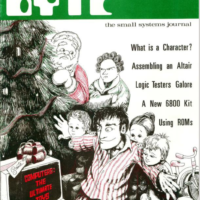
In the mid-1970s, before you could buy a computer at the store and no one yet called them “personal,” tech enthusiasts in the U.S. gathered around newsletters and magazines to imagine a more computerized future. For the past two years, my research assistant Rahul Zalkikar and I have been systematically exploring the first five years of Byte magazine, paying special attention to the commentary submitted by readers. Amid countless requests for help with sourcing parts and assembling kits, we found readers negotiating the norms and values of their fledgling technical culture. What sort of person could become a computer expert? How would non-experts make sense of these machines? And where would such a thing fit into the life of a family?
The preponderance of men in the microcomputing hobby became a recurring topic of discussion in the early issues of Byte. This spring, Rahul undertook a close examination of reader letters concerning gender, families, and computing. The result is a concise, provocative exploration of three moments in which Byte readers pushed back on the presumption that microcomputing was to remain the exclusive domain of (white, middle class) men.
From responses to a biased reader survey to a debate about the proper use of pronouns, Rahul identified a small but vocal group of Byte readers who seemed poised to challenge a social force that he terms “the dominant masculinity in the new world of personal computing.” By the early 1980s, this dominant masculinity was fixed in the stereotype of the “computer geek” but the debates in Rahul’s study highlight a brief moment of opportunity in which the microcomputer seemed to invite a re-imagining of technical expertise among enthusiasts. Perhaps by returning to this period of uncertainty, we might better understand the historical relationship between gender identity and what Joy Lisi Rankin calls “the act of computing.”
Rahul’s essay, “The Gender Binary of Computing: Challenging Sexism in Technology,” is available on his Github page, along with the data and source code underlying his statistical analyses. Rahul will be starting the M.S. in Data Science program at NYU this fall.
